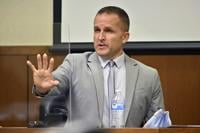MADISON, Wis. (AP) — The Wisconsin Supreme Court, in a 4-3 vote along partisan lines Friday, agreed to hear a challenge to Republican-drawn legislative maps after a newly elected liberal justice declined to recuse herself.
Justice Janet Protasiewicz’s decision to remain on the case increases the chance that Republicans, who control the Legislature and drew the maps, may proceed with the unprecedented step of impeaching her.
Assembly Speaker Robin Vos has threatened impeachment if she doesn’t step down. Vos had no immediate comment on her decision, saying he needed to first speak with his attorney.
Two lawsuits challenging the latest maps were filed in the first week after Protasiewicz joined the Supreme Court on Aug. 1. Protasiewicz is part of a 4-3 on the court, ending a 15-year run with conservative justices in control.
The court on Friday agreed to hear one of the cases and dismissed the other. All four liberal justices agreed to take the case, while the three conservative justices dissented.
The court agreed to hear arguments that the current and that they violate the Wisconsin Constitution’s separation of powers doctrine. It asked both sides what remedy it should impose if it determines the current maps are unconstitutional.
Chief Justice Annette Ziegler, a conservative, said in her dissent that liberals were hearing the case only because they now have the majority. She said it “appears to be evidence of a partisan and political, rather than a reasoned and restrained, approach, and thus departs from the constitutional role of the judiciary.”
Republicans argue Protasiewicz has pre-judged the case, which could result in new, more Democrat-friendly maps being drawn before the 2024 election.
Conservative Justice Rebecca Bradley, in her own scorching dissent likening the majority’s decision to a “mad tea-party,” went after Protasiewicz for not recusing.
“The probability of actual bias on Protasiewicz’s part likely approaches 100%,” Bradley wrote.
In her 64-page order, Protasiewicz said she understood that the issue had “engendered strong feelings in some quarters among people of good faith.” But she said after searching the law “and my conscience,” she did not need to recuse.
Protasiewicz said that while stating her opinion about the maps, she never made a promise or pledge about how she would rule on the cases.
“I will set aside my opinions and decide cases based on the law,” she wrote. “There will surely be many cases in which I reach results that I personally dislike. That is what it means to be a judge.”
The Wisconsin Judicial Commission, which investigates complaints against judges, earlier this year filed against Protasiewicz related to her comments on redistricting during the campaign.
Republicans had asked that Protasiewicz recuse from both redistricting cases, arguing in their motion that “Justice Protasiewicz’s campaign statements reveal that her thumb is very much on the scale in this case.” They also pointed to the nearly $10 million she received from the Wisconsin Democratic Party, which is not a party on the redistricting cases but has advocated for drawing new maps.
Other justices, both conservative and liberal, have on issues that could come before the court, although not always during their run for office like Protasiewicz did. Current justices have also from political parties and others with an interest in court cases, but none of them have faced threats of impeachment.
During her , Protasiewicz called the Republican-drawn maps “unfair” and “rigged” and said there needs to be “a fresh look at the gerrymandering question.” Protasiewicz never said how she would rule on a redistricting lawsuit.
“Recusal decisions are controlled by the law,” Protasiewicz wrote. “They are not a matter of personal preference. If precedent requires it, I must recuse. But if precedent does not warrant recusal, my oath binds me to participate.”
Protasiewicz said that is the case even if the case is controversial.
“Respect for the law must always prevail,” she wrote. “Allowing politics or pressure to sway my decision would betray my oath and destroy judicial independence.”
Protasiewicz said in Friday's order that she could find no case in which a judge recused because a political party not involved in the litigation had contributed to their campaign. She also noted, in a jab at her colleagues, that “justices of this court have repeatedly participated in redistricting cases despite receiving substantial support from politically affiliated groups during their campaigns.”
She said recusing in this case would “raise a swarm of continuing difficulties for each justice,” before listing large campaign donations received by her colleagues, conservative and liberal alike. The court’s work would grind to a halt if justices recused just because their involvement may be predicted to benefit a non-party to the case that supported their campaign, she wrote.
Attorneys who brought the lawsuits argued that there was for Protasiewicz to step aside. They also point to the Wisconsin Judicial Commission against her related to her comments during the campaign about redistricting.
The legislative electoral maps drawn by the Republican-controlled Legislature in 2011 , which now stand at 65-34 in the Assembly and a 22-11 supermajority in the Senate. Republicans adopted maps last year that were similar to the existing ones.
Wisconsin’s Assembly districts rank among the most gerrymandered nationally, with Republicans routinely winning far more seats than would be expected based on their average share of the vote, according to .
The lawsuit asks that all 132 state lawmakers be up for election in newly drawn districts. In Senate districts that are midway through a four-year term in 2024, there would be a special election, with the winners serving two years. The regular four-year cycle would resume again in 2026.
The lawsuit the court agreed to hear was filed on behalf of voters who support Democrats by the Stafford Rosenbaum law firm, Election Law Clinic at Harvard Law School, Campaign Legal Center, the Arnold & Porter law firm and Law Forward, a Madison-based liberal law firm.








































